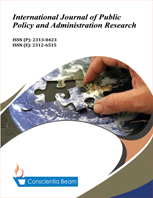Participatory Processes in Planning for Self-Help Housing Provision in South Africa: Policies and Challenges
DOI:
https://doi.org/10.18488/journal.74.2018.51.24.36Abstract
In contemporary post-apartheid a number of housing policies have been made since the 1994 democratic dispensation in an attempt to solve housing problems especially for poor and low-income population in South Africa. The most recent policy has been the Comprehensive Housing Plan for the Development of Integrated Sustainable Human Settlements commonly known as the Breaking New Ground (BNG) housing plan of 2004. The aims of this paper are to present an overview and empirical analysis on research and emerging legitimisation of the participation of informal institutions in planning phase for housing development in rural areas. This paper analyses public participatory processes in the planning phase of rural housing project(s) in Jozini Municipality in KwaZulu-Natal. Since the establishment of a fully-fledged local government institutions and the promulgation of the BNG in 2004, inhabitants have experienced materialisation of new housing opportunities for community members. These opportunities created during the planning phase which results to community members benefiting in housing development excludes the poor in the process of self-help subsidy administration and housing allocation. Grounded on the works of Foucauldian scholars especially the ‘discourse of power’ in participation, the paper argues that the local community members not only embody the local knowledge to be accessed, but their participation presents an important entry point to the political decision-making needed for collecting differing viewpoints and interests but also for initiating the negotiations needed that would lead to coordination, if not cooperation for housing development. We propose that participatory processes that are beneficiary to the poor are best understood when traced over time as a dynamic response to a constantly unfolding-project related intervention.

